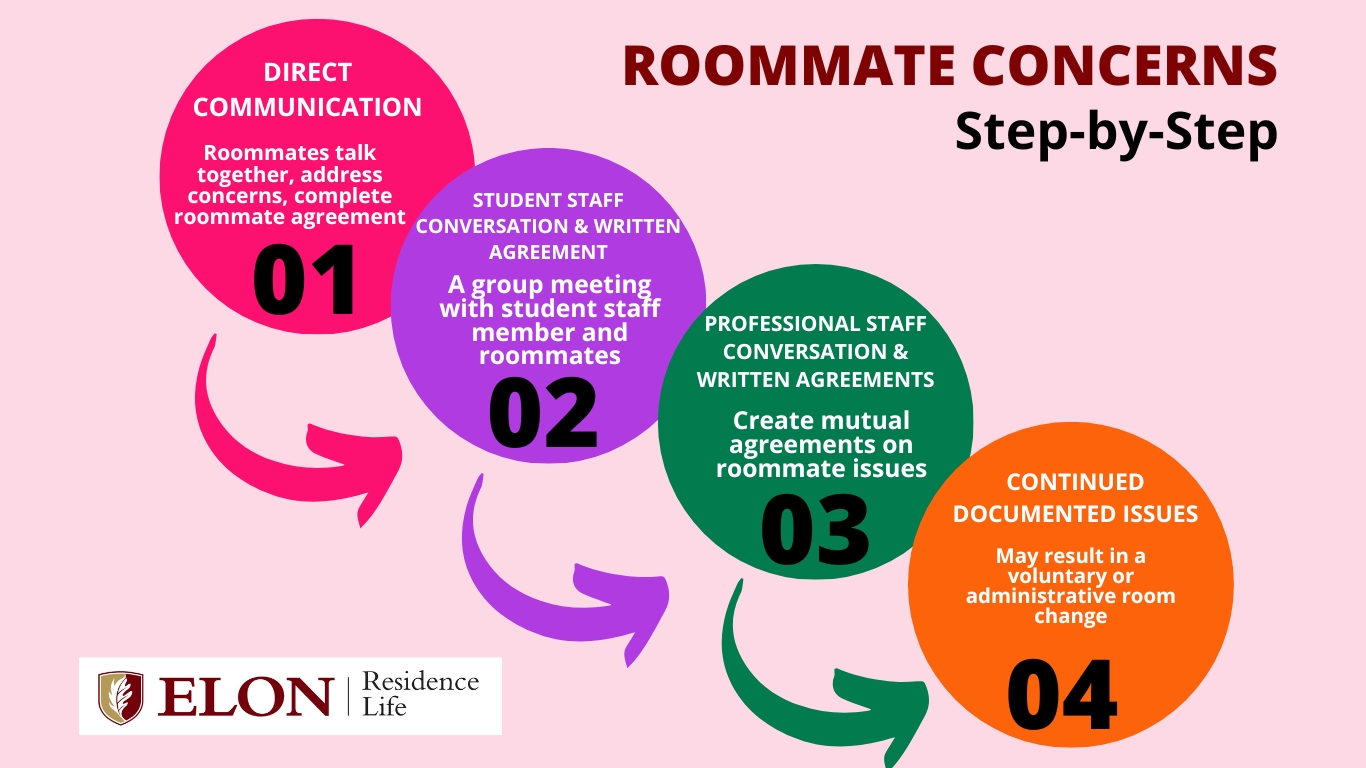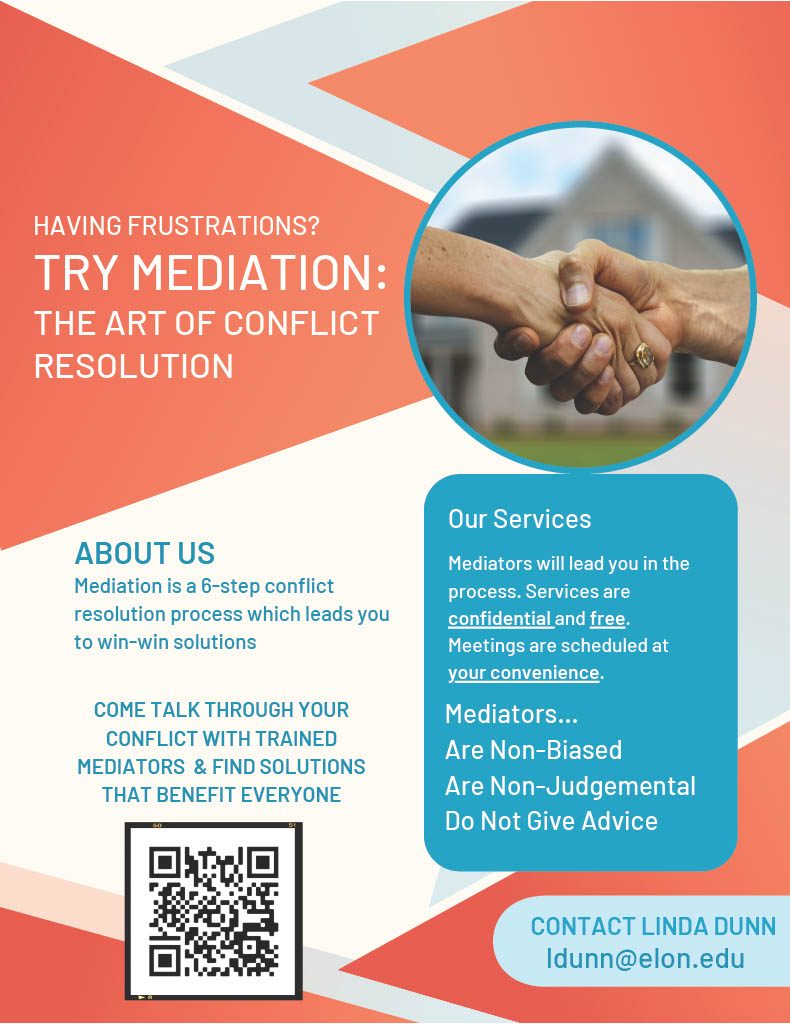- Home
- Campus Life
- Residence Life
- Policies, Procedures, Rates, and Forms
- Roommate Agreements & Conflict Resolution
Roommate Agreements & Conflict Resolution
What are Roommate Agreements?
Roommate Agreements serve as a tool to help guide residents through having important, and sometimes awkward, conversations, and to bring consensus regarding their living environment. The agreement is a living document and is not intended to create a binding obligation between any individuals or with the University. Students will have the opportunity to set agreed upon expectations of cleanliness, guests, and how they will communicate regarding their shared living space. Thinking through how roommates want to share a space is a best practice for enhancing a residential experience.
Roommate Agreement Process Overview
Before completing the Roommate Agreement, take time to personally reflect to determine your individual needs regarding your living environment. Get to know your roommates’ (and/or suitemates’) personality, and academic and social styles to determine how you can work with them to create a positive residential experience.
- Within your first week living together, find a time to sit with your roommate(s)/suitemate(s) and log into your Self-Service to complete the Roommate Agreement by discussing the questions and providing agreed upon answers to submit. Only one student per room/suite/flat/apartment needs to submit the mutually completed Roommate Agreement.
- Roommate Agreements are required for all first and second year students.
- Roommate Agreements are highly encouraged for all residential students.
- Request the assistance of your Residence Life student staff member as needed to help facilitate the conversation.
- Neighborhood professional staff members will review roommate agreements to ensure they were completed.
- Residents can revisit the Roommate Agreement to make updates as needed. If roommate conflicts with the agreements arise, please refer to the Conflict Resolution section below.
Roommate Agreement Topics May Include:
- Our door will be kept: (locked at all times, unlocked when someone is home, etc.)
- When one of us is sleeping in the room, we are okay with (complete quiet, lights on/off, normal volume, low noise-music/tv/calls, etc.)
- We agree the following times are considered too early and too late, respectively for noise on weekdays: (before 8am and after 1am)
- We agree our best method of communication, including regarding issues is: (in-person, text, call, email)
- Guests agreements in our room include: (when they can enter, if they can sit on each others bed, eat each others food, use TV, etc.)
- In maintaining a clean and neat space we agree to take out trash/recycling and vacuum/dust: (every other day, once a week, as needed)
- We agree to share the following personal belongings: (tv/fridge/microwave/snacks/clothes, etc.)
Conflict Resolution and Mediation
Steps to take to resolve roommate conflicts:
- Talk directly to your roommate/suitemates about the issue. It’s often better to talk directly to your roommate first about concerns and not to other students/friends. Try using an “I statement” to center how you feel or how you are impacted by the issue.
- If you need help figuring out how to address an issue with your roommate, your assigned Residence Life Student Staff member (RA, AM, HM, etc.) is available to meet with you. If your student staff member is unavailable, a student staff member is available in the neighborhood office during business hours or on-call after 5pm daily.
- If you’ve already talked to your roommate about the issue, your Residence Life Student Staff member can schedule a time to meet with you all to address concerns as a group. This meeting may focus on communication, compromise and updating your Roommate Agreement (if needed).
- If you’ve already taken the steps above, your Student Staff member can refer you to the professional staff in your neighborhood office for next steps. This may include an additional facilitated conversation between roommates to address disagreements and conflict. You can find contact information for all neighborhood offices online.
- After the steps above have been completed, students may choose to explore a student requested room change. Room changes are based upon availability and will only be offered after appropriate interventions strategies have been explored.
- Students are expected to adhere to mutually agreed upon Roommate Agreement Addendums. Failure to abide by Roommate Agreement Addendums may result in additional meetings with Residence Life staff or Administrative Room Changes, which may include Residence Life staff determining whom from the space will be reassigned.
Additional Campus Resources
Residence Life understands that conflicts in the living space can and do arise and encourages students to rely on campus resources to provide support.
- Elon’s Student Care and Outreach team provides outreach and support for students with significant and complex concerns regarding their health, well-being or behavior.
- Office of Inclusive Excellence and Development offers education, support and resources for students facing various types of interpersonal conflict.
- Office of Student Conduct
- Title IX
- Mediation – Elon also offers free and confidential mediation services to help students find solutions that benefit all. Please contact Linda Dunn (ldunn@elon.edu) for questions and information regarding mediation services.

